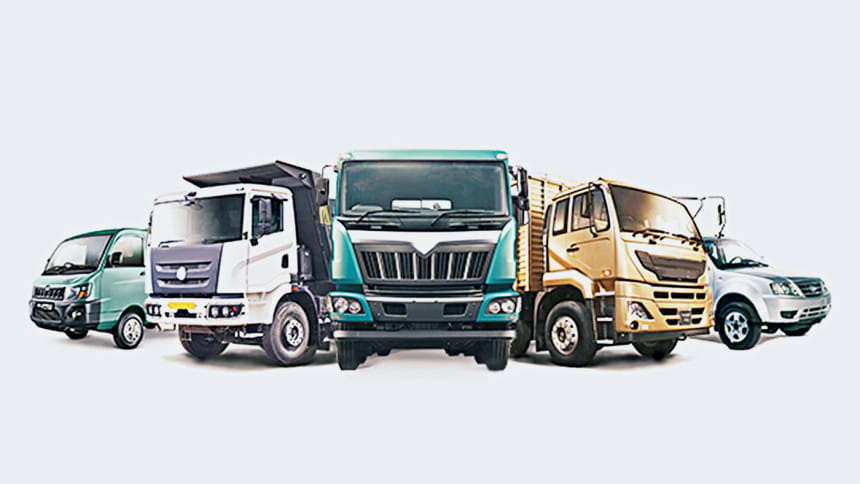Demand for commercial vehicles climbing after Covid

The demand for commercial vehicles in Bangladesh has increased as economic activities in the country boomed soon after a prolonged nationwide lockdown aimed at curbing the spread of Covid-19 ended earlier this year.
Besides, the use of commercial vehicles has grown exponentially over the past decade, according to market players.
"Around 2,500 trucks, cargo vans, pickups and tankers have been sold in September, up about 70 per cent from 1,200 units to 1,500 units previously," said Abdul Matlub Ahmad, chairman of Nitol-Niloy Group.
"But we still cannot cope with the full demand," he added.
At least 38,000 units of commercial vehicles, including buses, trucks, auto-rickshaws and tankers were sold in 2019, which is significantly higher than the 3,000 units sold annually ten years ago.
"But the demand was 50 per cent less in 2020 due to the economic impact of Covid-19," Ahmad said.
At present, the domestic market size of commercial vehicles is about Tk 4,400 crore while it was about Tk 2,000 crore in 2010, he added.
Of the total demand for commercial vehicles, truck, pick-ups , lorries, and covered van's hold a commanding share of between 60 per cent to 65 per cent.
The chairman of Nitol-Niloy Group went on to say that the commercial vehicle sector will be able to recover from the coronavirus-induced losses incurred in the past 18 months by this year as market demand increased with the country's return to normalcy.
In addition, people have realized that ensuring smooth continuation of economic activities takes first priority following the implementation of health safety guidelines in coping with the pandemic.
Various market players say that Indian automakers TATA, Ashok Leyland and Eicher cater to most of the demand for trucks in Bangladesh.
However, the presence of Japanese and Chinese truck manufacturers is very insignificant.
The Indian companies were able to solidify their foothold in Bangladesh as they entered the country back in the 1980s and have since gradually overtaken their fellow asian and european counterparts.
Market players in the commercial vehicle segment said most of their demand comes from the country's garments industry, which uses a vast number of trucks and other cargo carriers to transport products.
The growing cement, steel, and shipbuilding sectors are also making increasing contributions to the commercial vehicle industry as they need to transport numerous heavy raw materials.
Moreover, the booming e-commerce industry is directly fuelling vehicle purchases as they need to transport goods all over the country.
Meanwhile, the government policy on axle loads that limits the weight carried by each truck in order to reduce damage to roads forces the use of more trucks and other such vehicles.
Echoing Ahmad, Taskeen Ahmed, managing director of IFAD Autos Limited, said sales started to boom after economic activities resumed in the country.
As such, the commercial vehicle segment of the automobile sector will continue to blossom in line with the rising economic activities.
"But the sector needs at least another year to recover from the pandemic-induced losses." Ahmed said.
However, there is no reliable data on how much money was lost by the industry.
"Not only the sellers but also the operators of transport faced huge losses," he added.
Hafizur Rahman Khan, chairman of Runner Group, had previously told The Daily Star that Bangladesh is a potential market for commercial vehicles as its economy is booming.
"The demand for commercial vehicles will continue to grow as you need vehicles for moving products as well as people's movement," he said.
The market size of commercial vehicles grew 15 per cent to 20 per cent annually over the last one decade, Khan added.
Around 7,808 trucks were registered in the seven months leading up to July this year, shows data from the Bangladesh Road Transport Authority.
The total number of trucks registered stood at 21,212 units in 2019, 7,275 in 2016, 6,330 in 2015, and 8,136 in 2014.
As of August this year, the state agency has registered 3,504 trucks, 2023 covered vans, 819 delivery vans, and 6,399 pickups.
The commercial segment of the automotive industry in Bangladesh is dominated by imports, mostly from India, China and Japan.
Commercial vehicles are imported from India mainly due to competitive pricing and availability of spare parts, Khan said.
He went on to say that Indian commercial cars are viable due to their lower price and fuel efficiency compared to Japanese vehicles.
The local automobile manufacturing and assembling industries in Bangladesh have not grown adequately in the last three decades because of a lack of raw materials, according to a review of IDLC, a non-bank financial institution .
Now, Runner Motors, Nitol Tata, Ifad Autos and Rangs Motors have set up small-scale assembly plants in collaboration with foreign companies such as Hino, Mitsubishi, Tata Motors, and Ashok Leyland to assemble cars, trucks, pickups and buses.
In the commercial vehicle segment, Nitol is the market leader in Bangladesh followed by Ifad Auto Runner Motors, according to the IDLC review.
Khan of Runner Group said local entrepreneurs will soon go for automobile manufacturing in the country.
"The first step for an automobile manufacturer is to set up an assembly plant before going for manufacturing. Some local entrepreneurs have set up assembly plants and now, the country is on track to manufacture automobiles," he added.
There are 14 to 16 large automobile retailers in the country. Of them, five or six have assembly plants while the rest are sole distributors or importers of selected international brands, according to industry insiders.
Ifad Autos, Aftab Auto, Navana, Rangs, Rancon Motors, Nitol Motors, Runner Motors and AG automobiles are major distributors in Bangladesh.

 For all latest news, follow The Daily Star's Google News channel.
For all latest news, follow The Daily Star's Google News channel. 



Comments